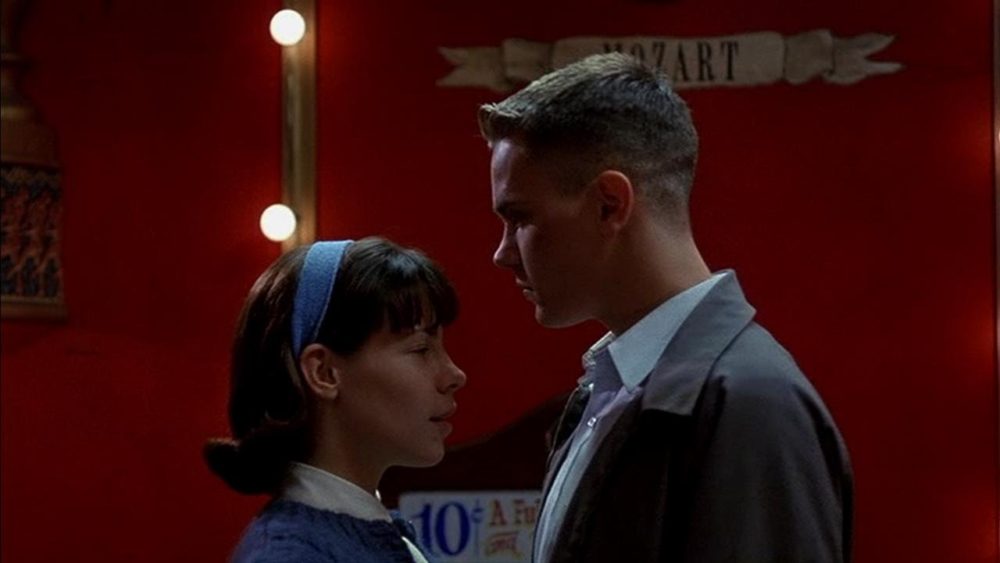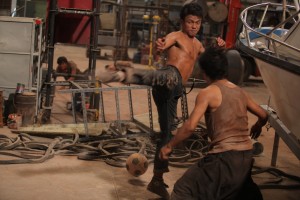
Nancy Savoca’s Dogfight is a perfect example of a great movie that has fallen through the cracks over time. Its director isn’t a household name; its writer, Bob Comfort, was a refugee from television with little to his name besides The Redd Foxx Show; and despite starring the inimitable River Phoenix, it had the misfortune of coming out the same year as another River Phoenix movie called My Own Private Idaho. And so, like many other well-received indie dramas of its ilk, it got lost in the shuffle for over a decade, resurfacing in the public eye in 2012 as a Drama Desk Award-nominated musical. The point being, I would never have gotten through this film via my usual channels. No canonical list includes it, no retrospectives talk about it, its positive notices lost in the fog of collective memory. So I salute the cinephiles that have put in many hours in the movie mines to dig this gem up, because its praises deserve to be sung.
Phoenix stars as Eddie Birdlace, a young Marine set to ship out to Vietnam the next day. As a final fuck you and farewell to life stateside, he and three of his compatriots engage in the titular dogfight, which sees them each buy in, bring a date to a bar, with the one bringing the biggest uggo of the bunch winning a cash prize. This is, unfortunately, a springboard for a lot of unfortunate comedy, but adequately sets the Marines up to be complete and total jagoffs. Except Phoenix; his jagoff has a crisis of conscience when we brings the shy, sweet budding folkie Rose (Lili Taylor, phenomenal) to the bar. She gets hip to the scheme, slaps Birdlace for good measure, and leaves in a huff. The story then diverges into parallel narratives. On the one hand, there’s Phoenix and Taylor, a disarmingly sweet story of forgiveness and the awkward, inelegant, but vastly exhilarating fumble towards meaningful human connection. On the other, you have the Marines, young men staring down the barrel of oblivion, their nihilism stoking the fire of their recklessness.
The bulk of this film is Eddie and Rose feeling each other out as people. When he punctuates his sentences with swear words to her consternation, she replies in kind to burst the bubble. As the night draws on, they become each other’s mean; his macho facade wanes while she becomes more assertive. They see each other more as people rather than ideas, and thus become full-fledged human beings with thoughts and emotions rather than just another dumb jock Marine or mousy waitress. There is something wonderful and poignant about their body language: every small caress in this film has the power to melt your heart. In contrast, the three other Marines (which includes standup lifer Anthony Clark, which you may recognize as the hotel barber from The Rock) continue to have a debaucherous Last Detail-style evening filled with real man stuff like tattoos and blowjobs, but unlike that movie, the men in Dogfight aren’t showing themselves a good time so much as they’re boys doing what they think needs to be done to self-actualize or stave off the inevitable. Friends are great, unless your relationship is based on, in the words of Richard Panebianco’s Berzin, “bullshit.”
The tenderness and wistfulness of the film is perfectly encapsulated in a sequence late in the film where, after spending the night together, Eddie must inevitably leave Rose. After they part, which is heart-wrenching in and of itself, there’s a great bleary-eyed wide shot of Phoenix running in the middle of the deserted streets towards the Golden Gate Bridge at the crack of dawn, all set to Bob Dylan’s “Don’t Think Twice, It’s Alright.” It’s a moment of great beauty and sadness, and one of many as the film eases into its near-perfect ending. I can think of few other movies I’ve that so gracefully capture the glory and sadness of establishing bonds with people and hoping against hope that all these years on, they’re still standing.
—
Directed by Nancy Savoca; written by Bob Comfort; starring River Phoenix, Lili Taylor, Richard Panebianco, Mitchell Whitfield, and Anthony Clark; 89 minutes.



 Derek
Derek
 Isabelle
Isabelle